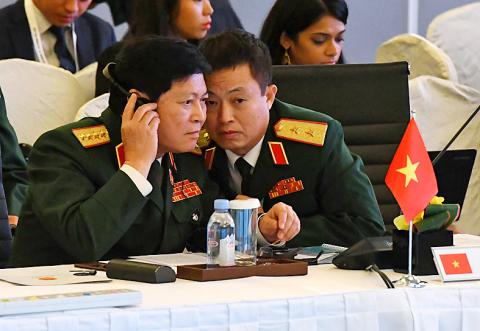China and Southeast Asian states are to hold their first joint maritime exercises next week, officials said yesterday, in a move aimed at easing tensions that might spark US alarm.
Despite disagreements over Beijing’s territorial ambitions, China and Southeast Asia are trying to strike a more conciliatory tone in a bid to stop tensions from spiraling out of control.
As part of this, the navies of China and the 10-member ASEAN are set to hold their first joint drills, which are to take place in the South China Sea.

Photo: AFP
“As we speak, the navies of ASEAN are en route to Zhanjiang in China for the ASEAN-China Maritime Exercise,” Singaporean Minister of Defense Ng Eng Hen (黃永宏) said.
Making the announcement at a gathering of ASEAN defense ministers in Singapore, also attended by US Secretary of Defense James Mattis and Chinese Minister of National Defense Wei Fenghe (魏鳳和), Ng said the drills would help to “build trust, confidence.”
The city of Zhanjiang is home to the South Sea Fleet of the Chinese People’s Liberation Army.
Tabletop exercises between ASEAN and China were held in Singapore in August to prepare for next week’s drills.
However, some observers see the exercise as part of efforts by China to diminish US influence in the region by forging closer ties with Washington’s traditional allies and partners.
In an apparent effort to lessen any such fears, Ng said that ASEAN was planning to hold maritime exercises with the US for the first time next year.
Mattis said that he did not believe the China-ASEAN drills would reduce US sway in the region.
“We do not see this as contrary to our interests,” he said. “If we can have that sort of activity going on, it’s transparent, something that’s been lacking in the South China Sea. Then that’s going to be working in the right direction.”
Hoang Thi Ha, a political analyst with the ISEAS Yusof Ishak Institute in Singapore, said that next week’s exercises were aimed at “demonstrating that China and ASEAN are managing well their maritime problems.”
However, its significance should not be overstated, as it is a one-off drill in waters that are not disputed, she added.
“The US is not losing ground exactly, because ASEAN chooses to be open and inclusive,” she said.
The Southeast Asian defense ministers also agreed on guidelines to prevent unplanned encounters between their military aircraft, and are to propose them to other countries, including the US and China, at a meeting today, Ng said.
They are aimed at reducing the likelihood that a chance encounter could spiral into conflict in the case of a miscalculation.
At yesterday’s meeting, Mattis said that “no single nation can rewrite the international rules of the road, and we expect all nations — large and small — to respect those rules.”
Mattis on Thursday met with Wei on the sidelines of the gathering as they sought to normalize military relations that have dramatically soured over trade and sanctions tensions.

BUILDUP: US General Dan Caine said Chinese military maneuvers are not routine exercises, but instead are ‘rehearsals for a forced unification’ with Taiwan China poses an increasingly aggressive threat to the US and deterring Beijing is the Pentagon’s top regional priority amid its rapid military buildup and invasion drills near Taiwan, US Secretary of Defense Pete Hegseth said on Tuesday. “Our pacing threat is communist China,” Hegseth told the US House of Representatives Appropriations Subcommittee on Defense during an oversight hearing with US General Dan Caine, chairman of the Joint Chiefs of Staff. “Beijing is preparing for war in the Indo-Pacific as part of its broader strategy to dominate that region and then the world,” Hegseth said, adding that if it succeeds, it could derail

CHIP WAR: The new restrictions are expected to cut off China’s access to Taiwan’s technologies, materials and equipment essential to building AI semiconductors Taiwan has blacklisted Huawei Technologies Co (華為) and Semiconductor Manufacturing International Corp (SMIC, 中芯), dealing another major blow to the two companies spearheading China’s efforts to develop cutting-edge artificial intelligence (AI) chip technologies. The Ministry of Economic Affairs’ International Trade Administration has included Huawei, SMIC and several of their subsidiaries in an update of its so-called strategic high-tech commodities entity list, the latest version on its Web site showed on Saturday. It did not publicly announce the change. Other entities on the list include organizations such as the Taliban and al-Qaeda, as well as companies in China, Iran and elsewhere. Local companies need

CRITICISM: It is generally accepted that the Straits Forum is a CCP ‘united front’ platform, and anyone attending should maintain Taiwan’s dignity, the council said The Mainland Affairs Council (MAC) yesterday said it deeply regrets that former president Ma Ying-jeou (馬英九) echoed the Chinese Communist Party’s (CCP) “one China” principle and “united front” tactics by telling the Straits Forum that Taiwanese yearn for both sides of the Taiwan Strait to move toward “peace” and “integration.” The 17th annual Straits Forum yesterday opened in Xiamen, China, and while the Chinese Nationalist Party’s (KMT) local government heads were absent for the first time in 17 years, Ma attended the forum as “former KMT chairperson” and met with Chinese People’s Political Consultative Conference Chairman Wang Huning (王滬寧). Wang

CROSS-STRAIT: The MAC said it barred the Chinese officials from attending an event, because they failed to provide guarantees that Taiwan would be treated with respect The Mainland Affairs Council (MAC) on Friday night defended its decision to bar Chinese officials and tourism representatives from attending a tourism event in Taipei next month, citing the unsafe conditions for Taiwanese in China. The Taipei International Summer Travel Expo, organized by the Taiwan Tourism Exchange Association, is to run from July 18 to 21. China’s Taiwan Affairs Office spokeswoman Zhu Fenglian (朱鳳蓮) on Friday said that representatives from China’s travel industry were excluded from the expo. The Democratic Progressive Party government is obstructing cross-strait tourism exchange in a vain attempt to ignore the mainstream support for peaceful development